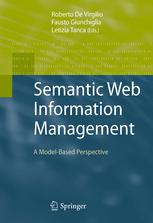

Most ebook files are in PDF format, so you can easily read them using various software such as Foxit Reader or directly on the Google Chrome browser.
Some ebook files are released by publishers in other formats such as .awz, .mobi, .epub, .fb2, etc. You may need to install specific software to read these formats on mobile/PC, such as Calibre.
Please read the tutorial at this link: https://ebookbell.com/faq
We offer FREE conversion to the popular formats you request; however, this may take some time. Therefore, right after payment, please email us, and we will try to provide the service as quickly as possible.
For some exceptional file formats or broken links (if any), please refrain from opening any disputes. Instead, email us first, and we will try to assist within a maximum of 6 hours.
EbookBell Team

0.0
0 reviewsDatabases have been designed to store large volumes of data and to provide efficient query interfaces. Semantic Web formats are geared towards capturing domain knowledge, interlinking annotations, and offering a high-level, machine-processable view of information. However, the gigantic amount of such useful information makes efficient management of it increasingly difficult, undermining the possibility of transforming it into useful knowledge.
The research presented by De Virgilio, Giunchiglia and Tanca tries to bridge the two worlds in order to leverage the efficiency and scalability of database-oriented technologies to support an ontological high-level view of data and metadata. The contributions present and analyze techniques for semantic information management, by taking advantage of the synergies between the logical basis of the Semantic Web and the logical foundations of data management. The book’s leitmotif is to propose models and methods especially tailored to represent and manage data that is appropriately structured for easier machine processing on the Web.
After two introductory chapters on data management and the Semantic Web in general, the remaining contributions are grouped into five parts on Semantic Web Data Storage, Reasoning in the Semantic Web, Semantic Web Data Querying, Semantic Web Applications, and Engineering Semantic Web Systems. The handbook-like presentation makes this volume an important reference on current work and a source of inspiration for future development, targeting academic and industrial researchers as well as graduate students in Semantic Web technologies or database design.